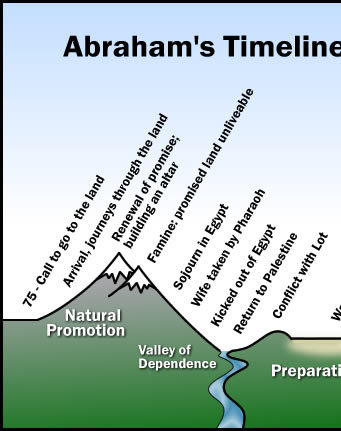I began to get interested in calling stages a decade ago through studying the life stories of biblical leaders. Abraham, David, Joseph, Paul, Moses, and even Jesus all seemed to go through similar transitions as they moved toward their calling: a period of early promotion, a crash, time in the wilderness, and then another productive period that led them eventually into the fullness of their call. The length of time it took them to reach their calling was a revelation. Another insight was that these leaders were all prepared outside their area of calling, something that didn't fit with my previous understanding of how calling worked. I learned alot from those stories!
The first application I made was reworking how I saw my own call to fit with what I was learning from scripture. It brought tremendous perspective to my wilderness years of Outside Preparation, and to the Releasing stage I was going through. Much of that original Bible study made it's way into The Calling Journey book--for each stage I've provided a study guide in the book so you can study these leaders for yourself.

When I began to share insights about the timeline, I saw people having a lot of "aha moments" as they began to consider calling as a developmental process instead of a roadmap to follow. Over the ten years since I've used this model repeatedly with the hundreds of ministry and business leaders I've coached and trained, often to great effect. I've also come to a greater understanding of the latter stages of the timeline as I've been going through them myself!
Originally, this material was going to be a chapter in a larger book on calling discovery that became the Christian Life Coaching Handbook. That chapter (and the book as a whole!) became too long, so I pulled out the calling stage material and set out to expand it into a separate book.
To flesh out and verify the model, I did approximately 40 extended interviews with contemporary leaders of all ages and vocations. For each of those leaders, I then constructed a personal timeline to solicit their feedback on how the model applied to their journey. At the same time, I also did quite a few informal interviews (similar in scope but without tabulating the data or constructing a paper timeline). The stories I heard in these interviews really made the book come alive!
A colleague, Dr. Myra Dingman, provided access to a research project on the development of historical leaders, which led to the inclusion of timelines for William Wilberforce and Mother Teresa. I also went back and looked at several other biblical characters in light of the timeline . While this research has led to some significant additions to the model (like the idea of Inside and Outside Preparation), the basic framework developed 10 years ago from the lives of Abraham, Joseph, Moses, David and Jesus remains at its core.
As a general model of the path to one's call, this model is not going to fit every person in every particular. Some of my subjects seem to have skipped stages, taken much longer or shorter than most to go through them, or seem to have repeated certain experiences. I believe this model will bring great insight to almost every leader, as long as we stay focused on the ways of God in developing people instead of getting hung up on whether our life exactly fits the map.
Because this is an attempt to create an ideal model of a calling timeline, I chose to interview people who seemed fairly on track in their calling journey. I have not focused on the ways we can go awry, or examined cases where a person has fallen away from God, given up on a call or chosen not to follow it. Also, since this model starts with a lordship decision to follow Christ, I have targeted individuals who made that commitment as interview subjects. God is certainly at work in everyone's lives, no matter how they are currently relating to him. However, The Calling Journey is based on the idea that calling is something that uniquely happens in the lives of those who make Jesus lord.
Since most people come to Christ by their twenties or not at all, I have not been able to adequately study the effect of mid-life conversions on the timeline. I'm looking forward to getting more data on that! So far, my experience is that the same stages apply, but are compressed in length. In addition, my subjects were almost all from North America, so I would expect that leaders from other countries might differ somewhat in their experience.
The timeline model addresses the developmental process of becoming who you are called to be. Figuring out what your calling is in the first place is covered in the companion volume, A Leader's Life Purpose Workbook. It contains over 60 discovery exercises you can use to identify your passions, dreams, values and strengths, discover who you are called to serve, develop a life mission statement and more. If you want to get the most out of your timeline, working through the calling process in this book (especially understanding the concept of a "being call") will make a big difference.